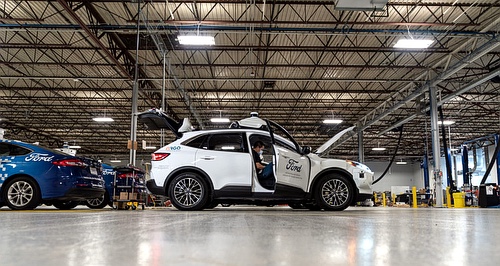News - General News - Autonomous TechnologyDriverless cars remain on agenda for GM, FordLOOKING AHEAD: Ford and GM both say they remain eager in seeing the fully autonomous vehicles on the road in years to come. Robo-taxi drops a bundle as auto giants seek driverless approval28 Jul 2022 GIANT US car-maker General Motors (GM) has this week disclosed it has dropped $US5.0 billion ($A 7.15b) since 2018 trying to build a robo-taxi business in San Francisco.
Adding insult to injury, GM now finds losses are accelerating as their new Cruise driverless unit starts charging for rides.
The company admitted this week that it lost $US500 million on Cruise during the second quarter of 2022, equating to a daily loss of more than US$5.0 million ($A7.1m).
This costly attempt to monetise driverless technology moving from a protracted research project to a profit-making business, has caused investors to back away and reassess how soon robot vehicles of any kind will be deployed in large scale on US public roads.
In the meantime, both Ford and GM are seeking approval from US government officials to deploy self-driving vehicles without steering wheels.
Both automakers want to bring into play up to 2500 vehicles a year, the maximum allowed under the law, for ride sharing and delivery services.
The two have petitioned US auto safety regulators to grant exemptions to deploy a limited number of self-driving vehicles without human controls like steering wheels and brake pedals.
On Wednesday July 27, the National Highway Traffic Safety Administration (NHTSA) published the separate petitions and opened them for public comment for 30 days.
NHTSA has authority to grant petitions to allow a limited number of vehicles to operate on US roads without required human controls.
In Australia, automated vehicles that do not meet current Australian Design Rules (ADRs) and/or could operate without a driver (for example, Level 3, 4 or 5 vehicles), cannot be used on Australian roads as current vehicle standards and laws require that vehicles meet the ADRs and always have a driver in control of the vehicle.
Such would appear to be not the case in the United States…
While both US automakers want to deploy the maximum allowed driverless vehicles for a specific purpose – ride sharing and delivery services – neither is seeking approval to sell self-driving vehicles to consumers.
Ford signalled its intention earlier this decade to deploy a self-driving, ride hailing and package delivery vehicle.
It’s called Argo AI, a driverless start-up backed by Ford and Volkswagen Group which began testing self-driving vehicles in three US states earlier this year without a human driver.
In a statement, the NHTSA said it “will carefully examine each petition to ensure safety is prioritised and to include considerations of access for people with disabilities, equity and the environment.”
Ford’s petition was submitted in July last year and has been undisclosed until now.
A Ford spokesperson said the “petition is an important step toward helping create a regulatory path that allows autonomous technologies to mature over time, eliminating controls and displays that are only useful to human drivers”.
GM’s proposed vehicle will not have steering wheels, pedals, manual turn signals or mirrors, while the one Ford proposes has the automated system giving commands for braking, throttle and steering.
GM wants to deploy the Origin, a vehicle with sliding subway-like doors and no steering wheels with all passengers restrained by seat belts before the vehicle starts moving.
In February this year, GM’s self-driving technology unit Cruise disclosed they petitioned NHTSA for permission to deploy self-driving vehicles without steering wheels, mirrors, turn signals or windshield wipers.
It follows a 2018 petition from GM to the NHTSA to allow a car based on a Chevrolet Bolt without steering wheels or brake pedals on US roads but the request was withdrawn.
GM said it continues to work with NHTSA “as their review continues and remain eager in seeing the fully autonomous Cruise Origin on the road in the years to come”.
Reports of accidents involving Cruise automated cabs and traffic snarls caused by Cruise-operated Chevy Bolt electric cars could complicate that effort.
Transport union members would also have something to say in opposition to the driverless robo-taxi.
 |
Click to shareGeneral News articlesResearch General News Motor industry news |














Facebook Twitter Instagram